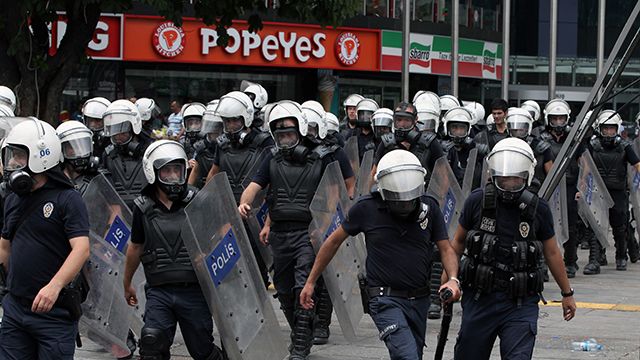
June has just ended and it was quite a rocky month for democracy. In debt-ridden Spain and Greece, people have poured into the streets to protest against austerity policies stripping them of livelihoods and vital public services, the better to serve the interests of banks in creditor nations. The capital of Brazil boils over in protests against a government elite rife with corruption but seemingly untouchable. In Ankara, too, massive rallies against the Turkish Prime Minister’s policies are answered by riot police, tear gas and rubber bullets.
All four of these countries are parliamentary democracies. What’s happening? Why haven’t the people’s representatives been able to corral their elected rulers into reflecting what seems to be the popular will? For that matter, why wasn’t America’s own modest version of street protest — the Occupy Wall Street movement — successful in producing strong legislation to counter the 99-to-1 inequality to which it called attention? Why was there so little public criticism when city police around the country wiped out Occupy encampments wherever found?
Maybe it was because of a general American faith in the good intentions of our government. But the last two weeks have rudely shaken that faith with the revelation that the government has been monitoring our electronic communications — in secret, no doubt, to spare us the inconvenience of forming and expressing dissenting opinions on the subject. But now that the truth is out we’re assured that it’s only to zero in on suspected terrorists. The data, say the program’s officials, would never, no never, be used to harass domestic opponents of an administration. Those of us old enough to remember the reign of J. Edgar Hoover and capers like COINTELPRO have heard that song before.
Then came the Supreme Court decision eviscerating the 48-year-old Voting Rights Act — claiming that its protections against racial discrimination are no longer necessary because the law already has done its work in eliminating barriers to the ballot box. This in the face of palpable Republican efforts not only in the old South but in Northern states to enact voter ID laws, rearrange times and places of registration and election, and in other ways do whatever it can to inconvenience, discourage and reduce black and low-income voters likely to vote Democratic. All this, knowing that the right to vote is the one on which all other rights and freedoms depend.
Pare down or minimize that right and democracy is hollowed out, artificial, a mere label. And if it is neutralized by a government that does not carry out in some fashion the clearly expressed sentiment of the winning coalition, then democracy is worse than enfeebled. It’s betrayed.
It’s that sense of betrayal that fuels the rage in the streets in other countries, and simmers under the surface here in the United States, where year after year initiatives that win majorities in polls — gun control and alternative energy being two of the most egregious — simply fail to get any traction in Congress.
How badly off are we? Does this widespread frustration prove that functional democracy is fast approaching rigor mortis? In downcast moments, I think so, but then I look for somewhat shaky comfort by reminding myself that the practice of democracy has always fallen short of the ideal.
Just a century ago, in 1913, the final universal victory of democracy in the modern world seemed a sure thing. Following an age of political revolutions, most European and Latin American nations, at least, had republican systems of government, and even where emperors and kings remained on their thrones, their once-total authority was confined by written constitutions and elected legislatures.
But things are not always what they seem. Whole classes of potential voters in these new republics and constitutional monarchies were still shut out. Some legislatures had upper houses still guaranteeing to the privileged the power of veto over reforms. In others, harsh censorship laws, including the threat of prison, crippled potential dissenting parties.
All the same, the momentum of history looked to be heading in the direction of freedom everywhere, even in heavily colonized Asia and to a lesser extent, Africa, where seeds of revolt were germinating.
But then came twin upheavals. The World War and the Great Depression fed revolutionary takeovers by right- and left-wing revolutionaries in Europe. Fascist dictatorships were openly contemptuous of “weak” democracy, whose flounderings were unequal to crises that a powerful leader with unchecked authority could solve for “his” people.
But left-wing dictatorships, chiefly the Soviet Union, followed a different script. To use the corporate-speak of today, they changed the product but kept the brand. Stalin’s imitators and satellites elsewhere took on the name of People’s Republics. Find on the map a “People’s Republic” that has survived the end of the Cold War and it will almost surely be a Communist dictatorship. The theocracy ruling Iran calls itself an Islamic Republic — evidence that, right or left, a democratic label on a regime does not insure democratic content. Some of the revolutionaries of the “Arab Spring” are interested only in swapping secular tyrants for tyrants who claim total rule in the name of God, whose intentions they alone are sure of.
To return to the United States, in the last hundred years what has been the history of our own democracy? From 1913 to 1971, it was an admirable record. The Constitution was amended eleven times, and six of them in one way or another expanded the outreach of freedom. Senators would be elected directly by the people, women got a guarantee of the right to vote, lengthy lame duck sessions of Congress were abolished — lawmakers thrown out by voters in November elections would no longer have several more months in office. Poll taxes were abolished, District of Columbia residents could vote — but only for president — and the voting age was reduced to eighteen. Moreover, the Voting Rights Act of 1965 revived the Fifteenth Amendment, passed in 1870 to allow blacks to vote, and but for the next 95 years effectively nullified in the South.
Alas, despite these enrichments, for at least three decades, government that’s genuinely of, by and for the people has been suffering slow strangulation with little sign of the garrote being loosened. We all know why — it’s the usual suspects, all traceable to the classic root of all evil, money: the corporate right to buy elections granted by the Supreme Court in Citizens United, the armies of lobbyists who pass through the revolving door between government offices and corporate suites, the gargantuan expenses of virtually permanent campaigning that make even honest legislators bend to the views of their big-time contributors rather than their constituents.
I am aware of no clear challenge from Capitol Hill to the bedrock premises that hardcore conservative opinion makers have zealously spread for many a year. “Free market” solutions to such problems as climate change and unemployment are always preferable to government-run programs. “Labor costs” — i.e., decent wages — must be reduced in order to promote economic growth. “Job creators” and “innovators” must be emancipated from regulations and taxes to remain competitive in the dog-eat-dog global economy. Public spending on ruinous “entitlements” and “wasteful” social programs (like feeding hungry children or helping poor students go to college) must be severely cut — the better to free up the billions needed for the second-to-none military forces and other elements of the national security state that protect us from terrorism.
It’s noisy, robust, pugnacious resistance to these ideas and the bad laws that flow from them that I don’t hear from important Democratic leaders, the president included. He and they alike appear to me to be settling for too little. If they can keep government from being drowned in a bathtub as the most radical right-wingers hope, they are then amenable to government’s occupying a servant’s role and a modest room in the House of Wealth.
What saves me from numbing depression is recalling the words of the great progressive rebels of the American past who won long fights against great odds, and listening to those few undiscouraged and active progressives of today who appear across the table from Bill Moyers weekly, as well as wherever they can find an audience. Their testimony is all the more vital because of what I see is actually a hidden long term consensus that belies the current partisan gridlock.
If democracy is really collapsing everywhere, then it’s all the more worthwhile to revive it here so that it “shall not perish from the earth.”
But as a prudential matter, I also keep in mind a line from my favorite progressive of the 21st century: “Democracy in America is a series of narrow escapes and we may be running out of luck.”
Happy Fourth of July!
 |
Bernard A. Weisberger is a historian who has been by turns a university professor, an editor of American Heritage and a collaborator on several of Bill’s documentaries. |

